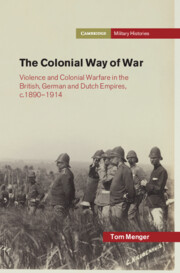
-
Select format
-
- Publisher:
- Cambridge University Press
- Publication date:
- September 2025
- August 2025
- ISBN:
- 9781009508278
- 9781009508285
- Dimensions:
- (229 x 152 mm)
- Weight & Pages:
- 0.69kg, 374 Pages
- Dimensions:
- Weight & Pages:
You may already have access via personal or institutional login- Series:
- Cambridge Military Histories
Book description
The violence of colonial wars between 1890 and 1914 is often thought to have been uniquely shaped by the nature of each of the European empires. This book argues instead that these wars' extreme violence was part of a shared 'Colonial Way of War'. Through detailed study of British, German and Dutch colonial wars, Tom Menger reveals the transimperial connectivity of fin-de-siècle colonial violence, including practices of scorched earth and extermination, such as the Herero Genocide (1904-1908). He explores how shared thought and practices arose from exchanges and transfers between actors of different empires, both Europeans and non-Europeans. These transfers can be traced in military manuals and other literature, but most notably in the transimperial mobility of military attachés, regular soldiers, settlers or 'adventurers'. Pioneering in its scope, Menger's work re-thinks the supposed exceptionality of standout cases of colonial violence, and more broadly challenges conceptions we have of imperial connectivity.
Reviews
‘Menger’s methodical study offers a genuinely comparative examination of the transimperial underpinnings of European colonial warfare, revealing a shared culture of extreme violence that challenges contemporary mythologies of national exceptionalism.’
Mark Condos - King’s College London
‘Tom Menger has traced the great similarities in thought and practice of extreme violence in colonial warfare at the fin-the-siecle. His book demonstrates how stimulating a transimperial approach in colonial military history can be. The Colonial Way of War has that ulitimate scholary quality: it makes you want to rethink old certainties.’
Petra M. H. Groen - Netherlands Institute for Military History
‘Grounded in extensive archival research pertaining to three different European empires, The Colonial Way of War is an impressive, densely documented transimperial study that overcomes the national constraints of military history. Tracing how knowledge about colonial warfare crossed imperial borders and emphasizing the key role of racialized warfare, Menger widens considerably our understanding of colonial military violence.’
Marie Muschalek - Basel University
‘In The Colonial Way of War, Menger presents a masterclass in transimperial history. Expertly tracing the circulation of shared practices of violence between the European powers during the era of high imperialism, the book makes short thrift of conventional scholarship that insists on outdated narratives of national exceptionalism.’
Kim A. Wagner - Queen Mary University of London
Contents
Metrics
Altmetric attention score
Full text views
Full text views help Loading metrics...
Loading metrics...
* Views captured on Cambridge Core between #date#. This data will be updated every 24 hours.
Usage data cannot currently be displayed.
Accessibility standard: Missing or limited accessibility features
Why this information is here
This section outlines the accessibility features of this content - including support for screen readers, full keyboard navigation and high-contrast display options. This may not be relevant for you.
Accessibility Information
The PDF of this book is known to have missing or limited accessibility features. We may be reviewing its accessibility for future improvement, but final compliance is not yet assured and may be subject to legal exceptions. If you have any questions, please contact accessibility@cambridge.org.
Content Navigation
Table of contents navigation
Allows you to navigate directly to chapters, sections, or non‐text items through a linked table of contents, reducing the need for extensive scrolling.
Index navigation
Provides an interactive index, letting you go straight to where a term or subject appears in the text without manual searching.
Reading Order and Textual Equivalents
Single logical reading order
You will encounter all content (including footnotes, captions, etc.) in a clear, sequential flow, making it easier to follow with assistive tools like screen readers.
Visualised data also available as non‐graphical data
You can access graphs or charts in a text or tabular format, so you are not excluded if you cannot process visual displays.
Structural and Technical Features
ARIA roles provided
You gain clarity from ARIA (Accessible Rich Internet Applications) roles and attributes, as they help assistive technologies interpret how each part of the content functions.


